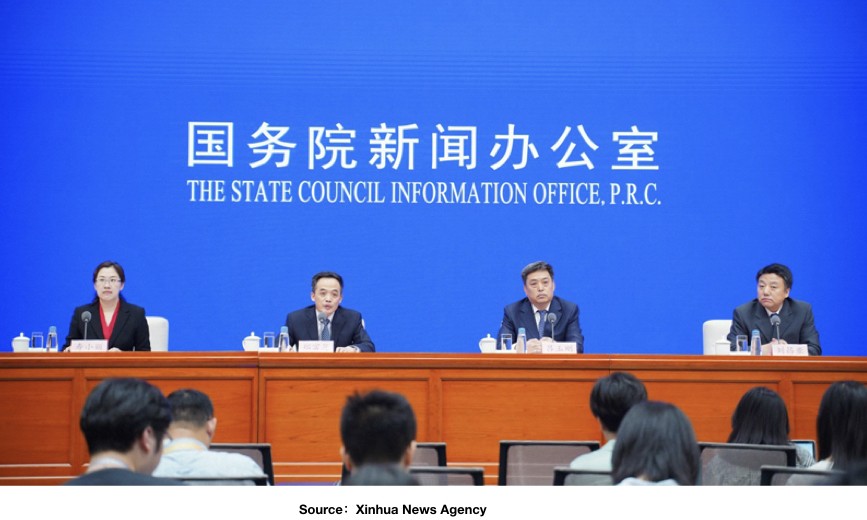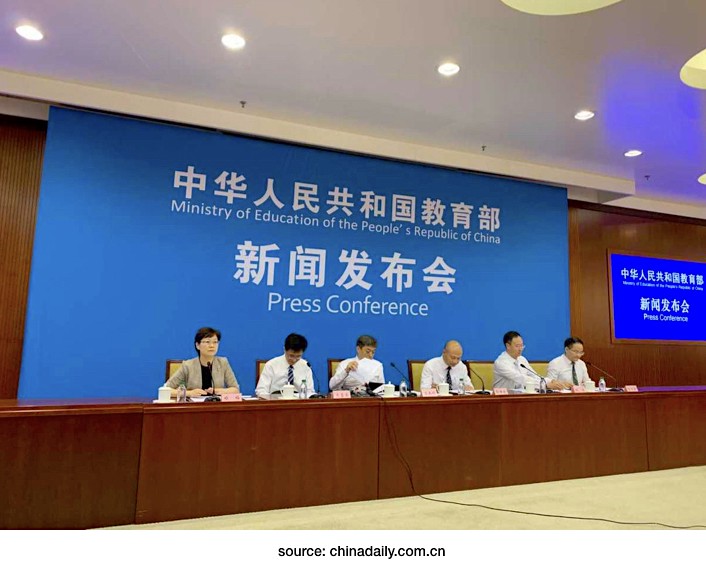
In a country rife with regulatory risk, policy laid out for a certain field may play a decisive role in this industry’s pivot point. For its oversight of the rapidly expanding education industry, Chinese government goes all in on implementing education reform by carrying out a series of regulations this July.
On July 8th, the Central Committee of the Communist Party of China and the State Council issued the “Opinions on Deepening the Reform of Education and Teaching to Improve the Quality of Compulsory Education” 《关于深化教育教学改革全面提高义务教育质量的意见》(hereinafter referred to as “Opinions”), which is the country’s first important document focusing on the reform of education and teaching in the compulsory education stage referring to a free nine-year compulsory education (six years of primary education and three years of secondary education). In this document, the term “anti-monopoly” was first put forward in the policy of supervision with after-school training institutions. And the inspection on such institutions has been regarded as an important way to lighten students’ burden.
To echo this regulation, on July 15th, the Ministry of Education, along with Cyberspace Administration of China and other four departments, issued the policy of “Implementation Opinions on Standardizing After-School Online Training”《关于规范校外线上培训的实施意见》 (hereinafter referred to as “Implementation Opinions”), which is the first official document in terms of after-school online training activities and also as part of regulating actions taken by the country since last year. After this, the supervision of both online and offline after-school training has been initiated.

Govt’s maximum commitment to deepening reform may pave the way for some game-changing effort urged in response to the new standards laid out for various sub-sectors in education space. In this piece, we will introduce and illustrate the most prominent parts emphasized by the documents and share our comprehensive insights by breaking down the analysis based upon different segments.
K-12 Education
Since 2017, the Chinese government has launched a sweeping inspection of curricular contents to standardize the curriculum and school textbooks for compulsory and high school education and clamp down on unapproved, foreign contents. Some people believe this action is really meant to target private schools offering bilingual curriculum.
Especially for international schools, teaching materials is always a prominent challenge that they have to deal with. In 2016, the Shanghai Municipal Education Commission run an inspection on the overseas textbooks of 21 international high schools in its area, calling for international schools’ self-reflection. After this, China’s National Textbook Committee has been established. The review and supervision of the textbooks have become increasingly tighter.
In the “Opinions” issued on July 8th, the State Council once again clearly proposed that schools should improve the quality of school-based curriculum without self-compiled textbooks in principle and replacing the national curriculum with local courses and school-based courses is strictly forbidden. It has also emphasized that K-12 schools are not allowed to introduce overseas curriculum and textbooks. So how to align with their own characteristics while adopting national curriculum standards may be the biggest challenge that international schools are facing at the moment.
Zuo Yang, the president of Orange County American High School(OCAHS), said to JMDedu that the introduction of overseas textbooks into international schools has always needed to be strictly overseen. He also explained that there are two sets of curriculum standards and systems for joint venture schools, “firstly, we have to meet the requirements of the curriculum standards of the Ministry of Education, then introduce the schemes that required by Orange County in California.”
In OCAHS, the national curriculum is carried out in the form of compulsory courses by using consistent textbooks with the public high schools here in China. The teaching materials of the school-based curriculum are compiled in light of their partner’s requirements from the US. After reviewed and certified by the officials, the textbooks will be introduced through a regular company running book import and export business then purchased by schools. Zuo Yang said that this is the normal process of introducing overseas textbooks in China all the time.
In addition, the “Opinions” mentioned that it is necessary to pay attention to differentiated teaching and individualized tutoring and combine the traditional and modern techniques in teaching activities, which is the business strategy adopted by companies such as iflytek and TAL targeting at penetrating into schools with their services. It is also worth noting that the “Opinions” once again emphasize that disclosing students’ grades and ranking in any form is banned so the enterprises that are still providing relevant services need to change their business layout.
Competence-based Education
The two policies mentioned at the beginning of the article also laid out relevant regulations on competence-based education. The “Opinions” released on July 8th even pointed out that developing competence-based education is the goal of deepening the reform at the current stage. This initiative could be the best news for many players in this field. Moreover, we find out that aligning with the inspection of offline after-school training institutions excluding competence-based training institutions, online institutions in this sub-sector are also not targeted in the “Implementation Opinions” issued on July 15th. However, the future of “mathematical thinking” and “big Chinese learning” (this term refers to a new subject-based learning mindset and advocates a comprehensive Chinese language training combining both liberal arts teaching and exam-oriented model) still remains to be unclear. Some industry insiders have indicated that whether they will be affected depends on the specific implementation by relevant departments.
The “Opinions” have put forward quite detailed measures in the five aspects of moral education, intellectual education, physical education, aesthetic education and labor education. For example, each student has to master at least one or two sports and artistic skills. Thee grade of physical education class is also counted into the total score of high school entrance examination. Science education needs to be strengthened and labor education classes should be no less than half of the comprehensive practical activity courses.
Physical education has been a highlight in the “Opinion”. The Ministry of Education has released several documents previously to encourage public schools to carry out a wide range of sports activities such as football, basketball and snow sports. But in fact, due to the limitations of campus conditions, public schools are still in urgent demand for upgraded solutions. Therefore, the “Opinions” clearly points out that schools are encouraged to purchase services from social organizations, giving more space to B2B companies that want to crack the school market.
In addition, the Ministry of Education held a press conference to introduce the National Youth Campus Football Work Report this Tuesday by pointing out the current situation of campus football field construction and advocating the development of young football talents in China. According to this report, 3000 football kindergartens are planned to be built in 2019. Meanwhile, in order to train football teachers for children, the first national demonstration training for football teachers is launched this July. 200 heads of kindergartens and 200 teachers are trained by the FA instructors, and such training will be carried out nationwide after the demonstration.
In addition, in the aspect of family education, the “Opinions” strengthened the acceleration of legislation and the construction of community sites for “parents’ schools”, aiming to guide parents with public welfare services.
Online Education
Same as the oversight towards offline training institutions, online after-school training also comes under govt scrutiny. “Implementation Opinions” issued on July 15th clarified the scope of this supervision that is referred to “online after-school subject training activities for primary and secondary school students (hereinafter referred to as after-school online training)”. According to the policy, the subjects of training include Chinese language, mathematics, English, ideological and political study, history, geography, physics, chemistry, and biology.
The “Implementation Opinions” also puts forward the regulations of online after-school training institutions including training content, duration and time as well as teacher credentials. As for training content, online training institutions are not allowed to teach ahead of the national syllabus. But how to judge this? Lv Yugang, director of the Department of Basic Education of the Ministry of Education, said that official measures will be established in the next step.
In terms of training duration, the policy requires that the duration of online training should be based upon the age and grade of students. And the length for each course should not exceed 40 minutes and the interval between each course should be no less than 10 minutes. Jin Lei, the founder of Magic Ears (an online English learning platform), told us that “the regulation of class lasting less than 40 minutes does have an impact on teaching and research.” Actually, there is a large number of institutions offering courses which are more than 40 minutes in both online language learning and online subject tutoring. Some organizations are prone to make some adjustments accordingly, which means that the teaching and research even course pricing will all be affected.
The release of the “Implementation Opinions” further clarified the requirements for the qualifications of online training institutions and improved the inspection on teachers’ teaching credentials at the same time. In terms of standardized management of foreign teachers, the “Implementation Opinions” raises the hiring bar and points out that companies hiring foreign personnel have to comply with relevant state regulations. Those who violate the law will be held to account harshly. Plus, the work and teaching experience of foreign teachers should be published in a prominent position on the websites or Apps.
The disparity in different regions when implementing relevant policies will indeed bring more possibilities to enterprises. But how to comply with policies and seize opportunities, enterprises need to think about their own answer.



